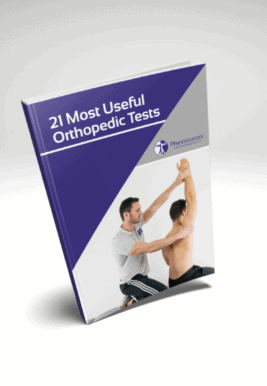Learn
Hornblower’s Sign | Teres Minor & Infraspinatus Insufficiency Assessment
Walch et al from 1998 report a sensitivity of 100% and specificity of 93% in the detection of irreparable fatty degeneration of the teres minor. While the numbers are solid, the research is at risk of bias and thus in our opinion, we can only attribute a weak clinical value to this test.
In a different study, Jain et al from 2017 report a sensitivity of 17% and specificity of 96% in the detection of an infraspinatus tear which results in a positive likelihood ratio of 4.25. In our opinion, the study produces acceptable results which is why we attribute their findings at least a moderate clinical value.
To conduct the test have the patient in sitting position with the arm abducted to 90° in the scapular plane. Flex the elbow to 90° and instruct the patient to perform external rotation against your resistance.
A positive test results in the inability of the patient to externally rotate in this position.
Other common orthopedic tests to assess for full-thickness tears of the rotator cuff are:
21 OF THE MOST USEFUL ORTHOPAEDIC TESTS IN CLINICAL PRACTICE

References
Like what you’re learning?
BUY THE FULL PHYSIOTUTORS ASSESSMENT BOOK
- 600+ Pages e-Book
- Interactive Content (Direct Video Demonstration, PubMed articles)
- Statistical Values for all Special Tests from the latest research
- Available in 🇬🇧 🇩🇪 🇫🇷 🇪🇸 🇮🇹 🇵🇹 🇹🇷
- And much more!








